cushing's support

free shipping over $100 (USA & Canada)
1-877-937-4372 the pet expert hotline


If you have a baby in your family and are looking to adopt a dog, chances are your google search is suggesting you adopt a boxer. These loving and puppy-eyed dogs are descendants of the very hardworking war dogs of the Assyrian empire from 2500 BC. Over the years the breed was bred down by German dog lovers and a breed similar to what we now know as the boxer breed was created. These hunter dogs were called the Bullenbeisser (“bull biter”). As hunting became less and less popular, the “bullbiter” was bred with smaller mastiff dogs and what was created was the modern boxer dog.
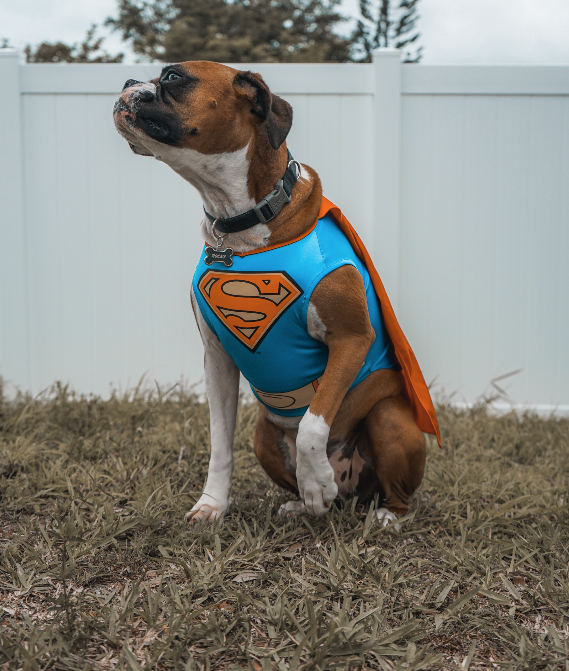
These athletic dogs have worn multiple hats – cattle dogs, police dogs, war dogs, watchdogs, and also guide dogs for the blind. They can also be really good babysitters, entertaining artists, and best friends for your cat.
They typically come in brindle, fawn, and sometimes white colors. Markings such as a black mask, black mask with white markings, and white markings are common. The chiseled head is in proportion to the body and skull with a broad, blunt muzzle which is the distinctive feature of the Boxer. Due to their short snouts, they tend to snore quite a bit though!
The average life expectancy is 10-12 years of age. Males weigh in at 65-80lbs where females are commonly about 15lbs smaller than males.
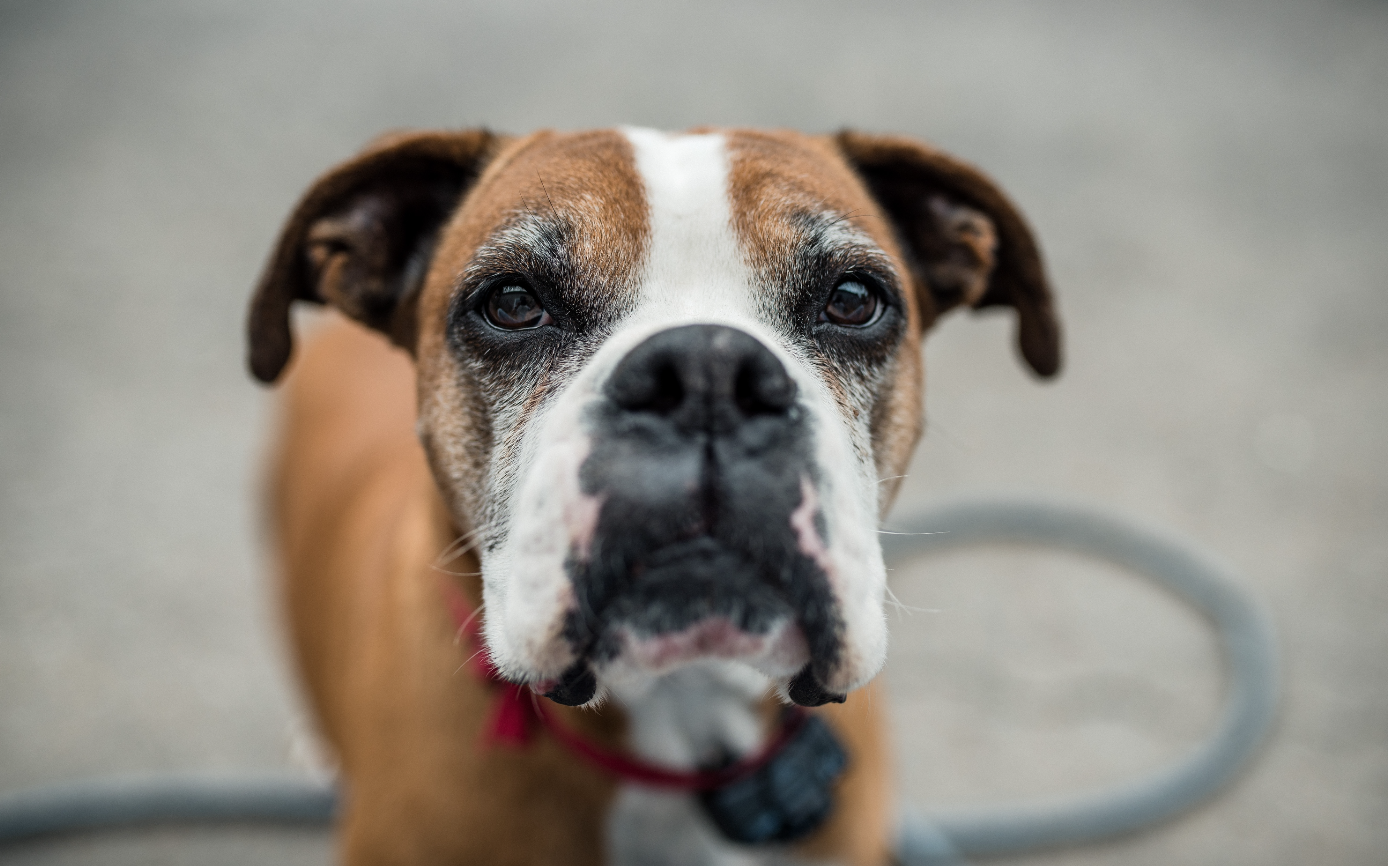
The name “Boxer” refers to the way the breed spars, like a prizefighter with their front paws when playing or defending themselves. But don’t let the name fool you. They are kind and gentle dogs who want nothing but attention.
They are known for their loyalty, affection, intelligence, and work ethic. They are happy, upbeat, playful, and love being part of a family with children. Socializing and exposing your boxer to many people and animals when they are young will ensure that they grow up to be a well-rounded member of the family who takes their job of guardian seriously and responsibly.

Life with a Boxer can be fun, entertaining, and fulfilling. They are great students who are learning basic commands very quickly. They are high-energy dogs and require a lot of exercises so an active family will find great companionship with a boxer!
Due to their short, tight-fitting coat, they don’t require a heavy amount of grooming. Using a short curry brush is the best as it helps to remove the loose hair as well as massage their skin keeping it healthy and shiny.
Every few months, it’s good to bathe them with a mild dog shampoo. Do not bathe too frequently as it can dry out their skin and cause itching.
Generally, a boxer dog will have good teeth however, some are prone to have issues that you can keep at bay by brushing daily.
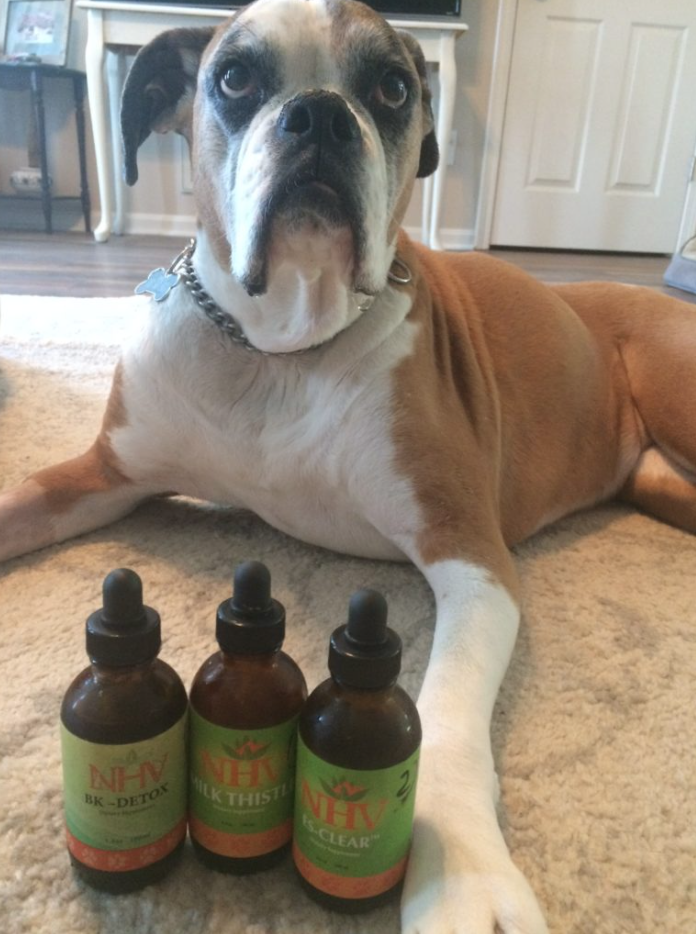

Boxers are prone to different ailments due to their genetics. Here are some that we see most frequently at NHV.
Lymphoma, Mast Cell Tumor, and Hemangiosarcoma are the three most common cancers seen in boxers. Symptoms vary according to the kind of cancer but changes in energy level and appetite should be paid attention to. Treatments such as chemotherapy, surgery, radiation, and prescribed medications are the most common. Although there is not much known about the root cause of these cancers, in boxer dogs it can be due to a genetic predisposition. You can do your best for prevention through a high-quality diet, omega 3 fatty acids, and by including NHV supplements such as Pet Cancer Immunity Plus kit in their diet proactively.
Bloating is common in dogs with deep, narrow chests like boxers, bulldogs, and Great Danes. The stomach fills with gas and twists over on itself. This cuts the blood supply to abdominal organs and if left untreated, this can quickly become fatal. Preventive surgery where the stomach is tacked down/sutured in place is highly recommended. It, therefore, becomes important to be careful with their diet and avoid feeding them prior to exercise or shortly after. Always give your boxer dog time to relax before and after meals.
Reduced activity levels, a visible potbelly, thin skin, and hair loss are advanced symptoms.
Cushing’s Disease is caused by a malfunction of the adrenal glands causing overproduction of glucocorticoids. It develops slowly and early signs often go undetected. Symptoms such as excessive drinking, panting, urinating and increased appetite are common. Reduced activity levels, a visible potbelly, thin skin, and hair loss are advanced symptoms. Regular veterinary visits and looking out for symptoms will help with early detection.
Multiple types of heart disease such as murmurs, dilated cardiomyopathy and congestive heart failure are a few that Boxers are genetically prone to. With regular veterinary visits, dental care, and weight control you can help prevent heart disease. The NHV Heart Health Kit contains supplements for the prevention and support of different heart conditions.
Wobbler’s disease causes a wobbly, drunken gait as a result of a narrowing of the vertebrae in the neck that pinches the spinal cord and associated nerves. The nerves, when pinched, cannot send adequate signals to the brain causing the pet to be unable to feel their feet. Treatments such as neck braces, rehabilitation programs, and surgery are most common. NHV Turmeric helps support the nervous system and also supports healing as an anti-inflammatory.
When the intestinal lining of the GI tract becomes inflamed and thickened it affects the ability to absorb nutrients properly. Chronic diarrhea and vomiting, weight loss, and skin issues are common. Treatment ranging from a change in diet, anti-inflammatory drugs, antibiotics, and vitamins are the most popular. NHV’s IBD Kit helps to aid in the evacuation of bacteria and ease inflammation of the GI Tract.
Boxer dogs are adorable goofballs and their humans often call them the best anti-depressants out there. They know when to cheer you up and when to just be your comfort cushion. They mold their energy levels according to the human or pet they are interacting with. With a healthy and well-balanced diet, regular heart health check-ups and some holistic supplements like NHV’s, your boxer dog can live a happier and healthier life. Feel free to get in touch with an NHV Pet Expert to talk about the best preventative care for your boxer.
cushing's support

Supraglan & Milk Thistle to Support Dog & Pet Cushing's Disease
bundle and save with pet expert kits
3 month supply for a small to medium size pet.
This kit of NHV Supraglan and NHV Milk Thistle natural vet-formulated herbal supplements may help support healthy adrenal gland function, liver enzyme levels, help your pet to fight infections.


This kit of NHV Supraglan and NHV Milk Thistle natural vet-formulated herbal supplements may help support healthy adrenal gland function, liver enzyme levels, help your pet to fight infections.

If your cat or dog has Cushing’s disease, the NHV Cushing’s Disease Essentials Kit may be beneficial in supporting your pet's overall health and well-being. The combination of NHV Supraglan and NHV Milk Thistle are vet approved and formulated to work synergistically in supporting their pituitary and adrenal gland, liver, and kidney function.
This kit can be taken alone, or together with the conventional Cushing’s treatment for cats and dogs that your veterinarian prescribes. These all-natural supplements are safe to take long-term.
Dog and cat Cushing’s disease is caused by the overproduction of the hormone cortisol by the adrenal gland. Animals with this disease have a suppressed immune system caused by the excessive production of cortisol in the body and are likely to get bladder infections due to this.
Supraglan is a natural herbal supplement that will help to balance the adrenal gland, improving the immune system and help the body fight infections. It may also aid in reducing thirst, excessive urination, appetite, help overall skin condition, and support the kidneys.
Milk Thistle helps support the liver and kidney function. Test results for animals that have Cushing’s indicated elevated liver enzyme levels and enlargement of the liver. Combing these products will help your pet live a healthy life. Visit our blog to read about other’s success in combating dog and pet Cushing’s disease with this essentials kit. Contact our pet experts if you have questions about options for Cushing’s treatment in cats & dogs.
Borage – Gently strengthens and improves adrenal function, and has been used for urinary issues and kidney inflammation.
Astragalus – Helps support the endocrine system, strengthens the immune system and acts as an anti-inflammatory. It has been found useful in helping the body recover from the effects of steroids, which affects the adrenal gland. Has both antibacterial and antiviral properties that aid your veterinarian’s recommended treatment for Cushing’s in cats & dogs.
Bistorte – A soothing anti-inflammatory that has a tonic effect on the liver and kidneys. In herbal medicine, it has been used to aid in urinary tract infections.
Eleuthero – A root that supports adrenal gland function, helps boost a sluggish metabolism, helps improve energy, and studies have shown that it improves the immune system.
Wild Yam – An herb that acts as a liver tonic, and helps normalize hormone production and kidney support. It helps with restlessness and nervousness.
Licorice – An herb that prevents the breakdown of the adrenal hormones. Improves digestion, helps boost immunity levels, and supports liver function.
Dandelion – A highly nutritious food that stimulates liver secretions, kidney function and improves digestion. High in natural vitamins and minerals.
Milk Thistle – In herbal medicine, this herb has been used for centuries to support, regenerate and remove toxins from the liver. Milk Thistle contains silymarin - a compound that protects the liver and stimulates, the production of new cells. It has powerful antioxidant properties, which helps strengthen the liver's resistance to toxic compounds. A healthy liver can be key to the treatment of Cushing’s disease in dogs and pets.
In pets, Milk Thistle is beneficial for damaged kidneys, as it has been shown to decrease the amount of time to heal while helping eliminate toxins.
Select your pet's weight to determine the correct dose.
To be taken twice daily. Determine your pet’s weight and then use the easy chart below to determine the correct dose. This is the minimum dosage.
Pet's Weight Dosage
0 - 15 lb = 0.5 ml
16 - 30 lb = 1.0 ml
31 - 45 lb = 1.5 ml
46 - 60 lb = 2.0 ml
61 - 75 lb = 2.5 ml
Over 75 lb = 3.0 ml
How to Administer
Refrigerate after opening.
Shake well. The easiest method is to use the dropper provided and place Supraglan and Milk Thistle drops into your dogs food or favorite treat. You can also use the dropper and squirt directly into the dogs mouth.
For Best Results
Herbal dietary supplements are beneficial to the health and well-being of your canine and are safe for long-term use. Every pet dog responds to natural herbal supplements differently, therefore it is important to be consistent and administer the product daily. Supplements generally take two to four weeks to take effect, however this will vary from one animal to the next.
Product Storage
All NHV Natural Pet Products are pure herbal extracts and contain no artificial additives, preservatives or coloring. Shelf life after opening is 6 months and must be refrigerated after opening.
Cautions and Contraindications
Do not use Supraglan in pregnant or nursing animals.
All information provided by NHV Natural Pet Products is for educational purposes only.
If your cat or dog has Cushing’s disease, the NHV Cushing’s Disease Essentials Kit may be beneficial in supporting your pet's overall health and well-being. The combination of NHV Supraglan and NHV Milk Thistle are vet approved and formulated to work synergistically in supporting their pituitary and adrenal gland, liver, and kidney function.
This kit can be taken alone, or together with the conventional Cushing’s treatment for cats and dogs that your veterinarian prescribes. These all-natural supplements are safe to take long-term.
Dog and cat Cushing’s disease is caused by the overproduction of the hormone cortisol by the adrenal gland. Animals with this disease have a suppressed immune system caused by the excessive production of cortisol in the body and are likely to get bladder infections due to this.
Supraglan is a natural herbal supplement that will help to balance the adrenal gland, improving the immune system and help the body fight infections. It may also aid in reducing thirst, excessive urination, appetite, help overall skin condition, and support the kidneys.
Milk Thistle helps support the liver and kidney function. Test results for animals that have Cushing’s indicated elevated liver enzyme levels and enlargement of the liver. Combing these products will help your pet live a healthy life. Visit our blog to read about other’s success in combating dog and pet Cushing’s disease with this essentials kit. Contact our pet experts if you have questions about options for Cushing’s treatment in cats & dogs.
Borage – Gently strengthens and improves adrenal function, and has been used for urinary issues and kidney inflammation.
Astragalus – Helps support the endocrine system, strengthens the immune system and acts as an anti-inflammatory. It has been found useful in helping the body recover from the effects of steroids, which affects the adrenal gland. Has both antibacterial and antiviral properties that aid your veterinarian’s recommended treatment for Cushing’s in cats & dogs.
Bistorte – A soothing anti-inflammatory that has a tonic effect on the liver and kidneys. In herbal medicine, it has been used to aid in urinary tract infections.
Eleuthero – A root that supports adrenal gland function, helps boost a sluggish metabolism, helps improve energy, and studies have shown that it improves the immune system.
Wild Yam – An herb that acts as a liver tonic, and helps normalize hormone production and kidney support. It helps with restlessness and nervousness.
Licorice – An herb that prevents the breakdown of the adrenal hormones. Improves digestion, helps boost immunity levels, and supports liver function.
Dandelion – A highly nutritious food that stimulates liver secretions, kidney function and improves digestion. High in natural vitamins and minerals.
Milk Thistle – In herbal medicine, this herb has been used for centuries to support, regenerate and remove toxins from the liver. Milk Thistle contains silymarin - a compound that protects the liver and stimulates, the production of new cells. It has powerful antioxidant properties, which helps strengthen the liver's resistance to toxic compounds. A healthy liver can be key to the treatment of Cushing’s disease in dogs and pets.
In pets, Milk Thistle is beneficial for damaged kidneys, as it has been shown to decrease the amount of time to heal while helping eliminate toxins.
Select your pet's weight to determine the correct dose.
To be taken twice daily. Determine your pet’s weight and then use the easy chart below to determine the correct dose. This is the minimum dosage.
Pet's Weight Dosage
0 - 15 lb = 0.5 ml
16 - 30 lb = 1.0 ml
31 - 45 lb = 1.5 ml
46 - 60 lb = 2.0 ml
61 - 75 lb = 2.5 ml
Over 75 lb = 3.0 ml
How to Administer
Refrigerate after opening.
Shake well. The easiest method is to use the dropper provided and place Supraglan and Milk Thistle drops into your dogs food or favorite treat. You can also use the dropper and squirt directly into the dogs mouth.
For Best Results
Herbal dietary supplements are beneficial to the health and well-being of your canine and are safe for long-term use. Every pet dog responds to natural herbal supplements differently, therefore it is important to be consistent and administer the product daily. Supplements generally take two to four weeks to take effect, however this will vary from one animal to the next.
Product Storage
All NHV Natural Pet Products are pure herbal extracts and contain no artificial additives, preservatives or coloring. Shelf life after opening is 6 months and must be refrigerated after opening.
Cautions and Contraindications
Do not use Supraglan in pregnant or nursing animals.
All information provided by NHV Natural Pet Products is for educational purposes only.
heart support

Hearty-Heart, Milk Thistle & Multi Essentials
bundle and save with pet expert kits
3 month supply for a small to medium size pet.



To be taken twice daily. Determine your pet’s weight and then use the easy chart below to determine the correct dose. This is the minimum dosage.
Pet's Weight Dosage
0 - 15 lb = 0.5 ml
16 - 30 lb = 1.0 ml
31 - 45 lb = 1.5 ml
46 - 60 lb = 2.0 ml
61 - 75 lb = 2.5 ml
Over 75 lb = 3.0 ml
How to Administer
Shake well before use. The easiest method is to use the dropper provided and place the drops into your pet’s food or favorite treat. You can also use the dropper and squirt directly into the pet’s mouth. Some pets can be finicky, if this occurs consider hiding the drops in foods most pet’s love such as fish, chicken or yogurt or a favorite treat. If your pet only eats dry food then soak a few kibbles at feeding time.
For Best Results
Herbal dietary supplements are beneficial to the health and well-being of your pet and are safe for long-term use. Every pet responds to natural herbal supplements differently, therefore it is important to be consistent and administer the product daily. Supplements generally take two to four weeks to take effect, however this will vary from one animal to the next.
Product Storage
All NHV Natural Pet Products are pure herbal extracts and contain no artificial additives, preservatives or coloring. Shelf life after opening is 6 months and must be refrigerated after opening.
Cautions and Contraindications
Do not use in pregnant or nursing animals.
All information provided by NHV Natural Pet Products is for educational purposes only.
Select your pet's weight to determine the correct dose.
Yes, sadly heart disease in dogs is extremely common. In dogs and cats, the most common types of heart disease include cardiomyopathy and valvular heart disease. The Hearty Heart is our main supplement to help support pet's with heart disease. The Milk Thistle and Multi Essentials will be helpful to support the body.
Your cat may not exhibit any symptoms that you may notice, so it's important to take your cat to the vet for regular visits so that any heart problems can be caught early. Sometimes a cat with heart problems may exhibit lethargy, difficulty breathing, and possibly fluid buildup in the lungs and chest.
Yes, we have many reviews which can be found on this page, on the Hearty-Heart page, on Facebook and on our blogs.
Our products are all natural and made with organic or ethically wildcrafted herbs. Just like you may see a variation of the smell and taste of strawberries depending on the season and other factors, there is some variation in the herbs. But rest assured our products are checked for quality assurance by our GMP and FDA certified facility and checked again by a third-party lab before leaving our warehouse.
To be taken twice daily. Determine your pet’s weight and then use the easy chart below to determine the correct dose. This is the minimum dosage.
Pet's Weight Dosage
0 - 15 lb = 0.5 ml
16 - 30 lb = 1.0 ml
31 - 45 lb = 1.5 ml
46 - 60 lb = 2.0 ml
61 - 75 lb = 2.5 ml
Over 75 lb = 3.0 ml
How to Administer
Shake well before use. The easiest method is to use the dropper provided and place the drops into your pet’s food or favorite treat. You can also use the dropper and squirt directly into the pet’s mouth. Some pets can be finicky, if this occurs consider hiding the drops in foods most pet’s love such as fish, chicken or yogurt or a favorite treat. If your pet only eats dry food then soak a few kibbles at feeding time.
For Best Results
Herbal dietary supplements are beneficial to the health and well-being of your pet and are safe for long-term use. Every pet responds to natural herbal supplements differently, therefore it is important to be consistent and administer the product daily. Supplements generally take two to four weeks to take effect, however this will vary from one animal to the next.
Product Storage
All NHV Natural Pet Products are pure herbal extracts and contain no artificial additives, preservatives or coloring. Shelf life after opening is 6 months and must be refrigerated after opening.
Cautions and Contraindications
Do not use in pregnant or nursing animals.
All information provided by NHV Natural Pet Products is for educational purposes only.
Select your pet's weight to determine the correct dose.
Yes, sadly heart disease in dogs is extremely common. In dogs and cats, the most common types of heart disease include cardiomyopathy and valvular heart disease. The Hearty Heart is our main supplement to help support pet's with heart disease. The Milk Thistle and Multi Essentials will be helpful to support the body.
Your cat may not exhibit any symptoms that you may notice, so it's important to take your cat to the vet for regular visits so that any heart problems can be caught early. Sometimes a cat with heart problems may exhibit lethargy, difficulty breathing, and possibly fluid buildup in the lungs and chest.
Yes, we have many reviews which can be found on this page, on the Hearty-Heart page, on Facebook and on our blogs.
Our products are all natural and made with organic or ethically wildcrafted herbs. Just like you may see a variation of the smell and taste of strawberries depending on the season and other factors, there is some variation in the herbs. But rest assured our products are checked for quality assurance by our GMP and FDA certified facility and checked again by a third-party lab before leaving our warehouse.
arthritis support
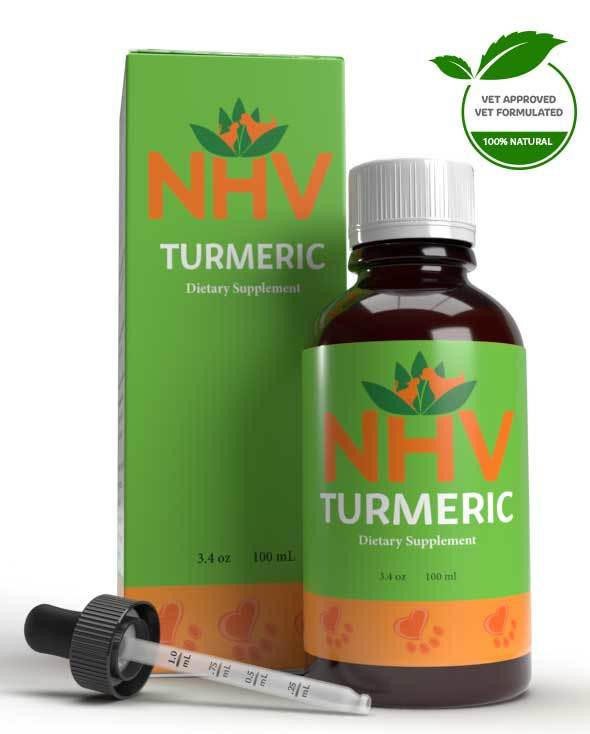
For Arthritis and Cancer Support
buy 2 and save $3
3 month supply for a small to medium size
Dogs love to root around in the dirt for goodies. But did you know one of the best things they could find would be turmeric? Turmeric for Dogs is a natural, antioxidant-rich supplement that supports your pup’s overall wellness.
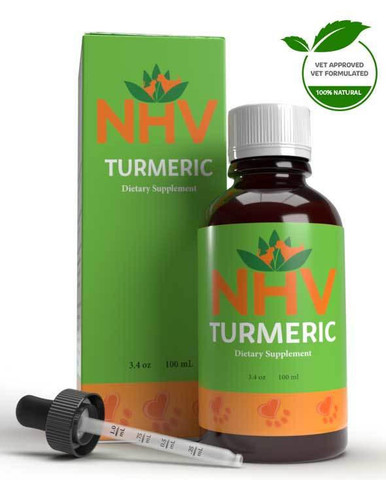
Dogs love to root around in the dirt for goodies. But did you know one of the best things they could find would be turmeric? Turmeric for Dogs is a natural, antioxidant-rich supplement that supports your pup’s overall wellness.
Sadly, your pup won’t find turmeric in their backyards unless you live in the tropics, where this amazing plant grows. However, they can benefit from this golden plant by taking a full-spectrum extract of Turmeric for Dogs.
Is turmeric good for dogs? Yes, most pups can use this safe and gentle herb for a number of health concerns. This is thanks to the organic compounds produced by the plant.
If you’re the pet parent of a sick pup, you might have a challenging journey ahead. Remember that love you feel for your dog will also play a big role, and if you need a little advice, our pet experts are here for you and can be reached by chat.
How does this incredible spice work? Turmeric is rich in antioxidants, which can help your precious pet with stress, pollution, and illness. In the body, Turmeric has the potential to help with both overall.
Pets that are sick have increased oxidation, so the antioxidants they get from food, medication, or supplements can help give them the extra they need.
As pet-parents ourselves, we know you only want the best for your pup. That’s why our extracts are made from human-grade, high quality ingredients. And when you choose NHV Turmeric, you’re choosing decades of holistic pet wellness experience from vets and herbalists who can help support your pet’s wellness journey. Our formula is:
Our turmeric was formulated by a master herbalist and holistic vet. Learn more about Dr. Hillary Cook’s use of turmeric and its benefits for pet health. We are also proud to have been a part of many dog success stories, like with our doggo friend, Captain Morgan.
Captain Morgan’s story: “Our bloodhound has been on turmeric for 2 months now. He has been getting up and down more smoothly and not as stiff in his backend. He loves the taste and we love how it has helped him
You can add daily supplements like Turmeric to top up your dog’s intake of natural, wellness-promoting ingredients. It can be given directly by mouth with the dropper provided, or it can be mixed into food or a favorite treat (this tip is dog-approved)!
All NHV supplements are made with the finest quality organic or ethically harvested herbs. We use non-GMO vegetable glycerin as our base. NHV products are full-spectrum extracts.
Select your pet's weight to determine the correct dose.
To be taken twice daily. Determine your pet’s weight and then use the easy chart below to determine the correct dose. This is the minimum dosage.
Pet's Weight Dosage
0 - 15 lb = 0.5 ml
16 - 30 lb = 1.0 ml
31 - 45 lb = 1.5 ml
46 - 60 lb = 2.0 ml
61 - 75 lb = 2.5 ml
Over 75 lb = 3.0 ml
How to Administer
Shake well before use. The easiest method is to use the dropper provide and places the drops into your pet’s food or favorite treat. You can also use the dropper and squirt directly into the pet’s mouth.
Some pets can be finicky, if this occurs consider hiding the drops in foods most pet’s love such as fish, chicken or yogurt or a favorite treat. If your pet only eats dry food then soak a few kibbles at feeding time.
For Best Results
Herbal dietary supplements are beneficial to the health and wellbeing of your pet and are safe for long-term use. Every pet responds to natural herbal supplements differently, therefore it is important to be consistent and administer the product daily. Supplements generally take two to four weeks to take effect, however this will vary from one animal to the next.
Product Storage
All NHV Natural Pet Products are pure herbal extracts and contain no artificial additives, preservatives or coloring. Shelf life after opening is 6 months and must be refrigerated after opening.
Cautions and Contraindications: Do not use Turmeric in pregnant or nursing animals. Speak to your vet before using our products. A second visit is recommended if your pet’s condition does not improve, or deteriorates after continued use of the supplements.
Sadly, your pup won’t find turmeric in their backyards unless you live in the tropics, where this amazing plant grows. However, they can benefit from this golden plant by taking a full-spectrum extract of Turmeric for Dogs.
Is turmeric good for dogs? Yes, most pups can use this safe and gentle herb for a number of health concerns. This is thanks to the organic compounds produced by the plant.
If you’re the pet parent of a sick pup, you might have a challenging journey ahead. Remember that love you feel for your dog will also play a big role, and if you need a little advice, our pet experts are here for you and can be reached by chat.
How does this incredible spice work? Turmeric is rich in antioxidants, which can help your precious pet with stress, pollution, and illness. In the body, Turmeric has the potential to help with both overall.
Pets that are sick have increased oxidation, so the antioxidants they get from food, medication, or supplements can help give them the extra they need.
As pet-parents ourselves, we know you only want the best for your pup. That’s why our extracts are made from human-grade, high quality ingredients. And when you choose NHV Turmeric, you’re choosing decades of holistic pet wellness experience from vets and herbalists who can help support your pet’s wellness journey. Our formula is:
Our turmeric was formulated by a master herbalist and holistic vet. Learn more about Dr. Hillary Cook’s use of turmeric and its benefits for pet health. We are also proud to have been a part of many dog success stories, like with our doggo friend, Captain Morgan.
Captain Morgan’s story: “Our bloodhound has been on turmeric for 2 months now. He has been getting up and down more smoothly and not as stiff in his backend. He loves the taste and we love how it has helped him
You can add daily supplements like Turmeric to top up your dog’s intake of natural, wellness-promoting ingredients. It can be given directly by mouth with the dropper provided, or it can be mixed into food or a favorite treat (this tip is dog-approved)!
All NHV supplements are made with the finest quality organic or ethically harvested herbs. We use non-GMO vegetable glycerin as our base. NHV products are full-spectrum extracts.
Select your pet's weight to determine the correct dose.
To be taken twice daily. Determine your pet’s weight and then use the easy chart below to determine the correct dose. This is the minimum dosage.
Pet's Weight Dosage
0 - 15 lb = 0.5 ml
16 - 30 lb = 1.0 ml
31 - 45 lb = 1.5 ml
46 - 60 lb = 2.0 ml
61 - 75 lb = 2.5 ml
Over 75 lb = 3.0 ml
How to Administer
Shake well before use. The easiest method is to use the dropper provide and places the drops into your pet’s food or favorite treat. You can also use the dropper and squirt directly into the pet’s mouth.
Some pets can be finicky, if this occurs consider hiding the drops in foods most pet’s love such as fish, chicken or yogurt or a favorite treat. If your pet only eats dry food then soak a few kibbles at feeding time.
For Best Results
Herbal dietary supplements are beneficial to the health and wellbeing of your pet and are safe for long-term use. Every pet responds to natural herbal supplements differently, therefore it is important to be consistent and administer the product daily. Supplements generally take two to four weeks to take effect, however this will vary from one animal to the next.
Product Storage
All NHV Natural Pet Products are pure herbal extracts and contain no artificial additives, preservatives or coloring. Shelf life after opening is 6 months and must be refrigerated after opening.
Cautions and Contraindications: Do not use Turmeric in pregnant or nursing animals. Speak to your vet before using our products. A second visit is recommended if your pet’s condition does not improve, or deteriorates after continued use of the supplements.
Published: November 7, 2019